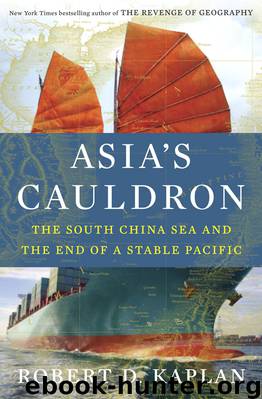Asia's Cauldron by Robert D. Kaplan

Author:Robert D. Kaplan [Kaplan, Robert D.]
Language: eng
Format: epub, mobi
ISBN: 978-0-8129-9433-9
Publisher: Random House Publishing Group
Published: 2014-03-24T16:00:00+00:00
“We had to make a living, to persuade investors to put their money into manufacturing plants and other businesses in Singapore. We had to learn to survive, without the British military umbrella and without a hinterland.”14
So begins the narrative thread in Lee’s second volume, which, even more than the first, approximates the lessons of Machiavelli’s The Prince.15 As Lee writes, “A soft people will vote for those who promised a soft way out,” and because there was no soft way out, Lee determined to forge a hard island race of overseas Chinese with Malay and Indian minorities. Only a hard people could build the “throbbing and humming” industrial, commercial, and communications center he envisioned. He would make a fair society, not a “welfare” society.16
Like the Israelis, Lee decided to “leapfrog the region”: faced with an initially hostile Malaysia and Indonesia, not to mention hostile communist regimes in China and North Vietnam, Lee’s Singapore would link up with America, Europe, and Japan by effusively welcoming multinational corporations, which, at the time, in the radical late 1960s, the “dependency school” of economists were condemning as Western colonialism in disguise. He would give multinationals taxfree status for years on end and control the labor unions to boot, in return for having Singaporeans learn Western technical skills at the new plants. Moreover, he would establish standards of safety, security, infrastructure, service, and even aesthetics—like highways lined with pruned shrubbery—that would attract a professional class of Western engineers and entrepreneurs, who would make Singapore their “base camp” in Asia. Corruption would not be a problem as in other Third World countries. Lee would attack it by simplifying procedures, establishing clear and precise guidelines in business, and making living beyond one’s means corroborative evidence in court for taking bribes. English would be the national language, reducing tensions among the various groups who all spoke different tongues and adding another lure to bring in Western banks and companies. Already, in the 1970s, as the oil crisis hit in the United States and the rebellious spirit of the 1960s youth movements was wearing off in the media, glowing reports began surfacing in newsmagazines about Singapore’s progress. Singapore, Inc., was in the process of being born. The fact that twenty-first-century Asia is all about business had a start in 1970s Singapore.17
More so than Mahathir, Lee was manic and meticulous. He demanded maintenance of facilities, and banned spitting, chewing gum, and tobacco advertisements. He chastises the Americans for being far behind in stigmatizing cigarette smoking, because their tobacco lobby was too powerful for too long. Foreign correspondents ridiculed Singapore as a “nanny state.” Lee’s response is that journalists make fun of his edicts only because Singapore offered them no big scandals, corruption cases, or grave wrongdoing to report. Lee criticizes the Western media for being “cynical” about authority, and points out that a freewheeling press in India, the Philippines, and Thailand have not stemmed raging corruption in those places, while Singapore, with its controlled press, has little corruption and meritocratic government.
Download
This site does not store any files on its server. We only index and link to content provided by other sites. Please contact the content providers to delete copyright contents if any and email us, we'll remove relevant links or contents immediately.
| Arms Control | Diplomacy |
| Security | Trades & Tariffs |
| Treaties | African |
| Asian | Australian & Oceanian |
| Canadian | Caribbean & Latin American |
| European | Middle Eastern |
| Russian & Former Soviet Union |
The Secret History by Donna Tartt(19088)
The Social Justice Warrior Handbook by Lisa De Pasquale(12190)
Thirteen Reasons Why by Jay Asher(8909)
This Is How You Lose Her by Junot Diaz(6887)
Weapons of Math Destruction by Cathy O'Neil(6279)
Zero to One by Peter Thiel(5802)
Beartown by Fredrik Backman(5754)
The Myth of the Strong Leader by Archie Brown(5507)
The Fire Next Time by James Baldwin(5444)
How Democracies Die by Steven Levitsky & Daniel Ziblatt(5218)
Promise Me, Dad by Joe Biden(5153)
Stone's Rules by Roger Stone(5088)
A Higher Loyalty: Truth, Lies, and Leadership by James Comey(4963)
100 Deadly Skills by Clint Emerson(4925)
Rise and Kill First by Ronen Bergman(4789)
Secrecy World by Jake Bernstein(4753)
The David Icke Guide to the Global Conspiracy (and how to end it) by David Icke(4718)
The Farm by Tom Rob Smith(4509)
The Doomsday Machine by Daniel Ellsberg(4490)
